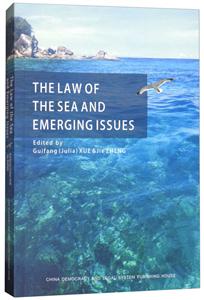-
>
法律的悖論(簽章版)
-
>
中華人民共和國憲法
-
>
中華人民共和國勞動法
-
>
私人財富保護、傳承與工具
-
>
再審洞穴奇案
-
>
法醫追兇:破譯犯罪現場的156個冷知識
-
>
法醫追兇:偵破罪案的214個冷知識
THE LAW OF THE SEA AND EMERGING ISSUES-海洋法前沿-新議題與新挑戰-英文 版權信息
- ISBN:9787516217610
- 條形碼:9787516217610 ; 978-7-5162-1761-0
- 裝幀:一般膠版紙
- 冊數:暫無
- 重量:暫無
- 所屬分類:>
THE LAW OF THE SEA AND EMERGING ISSUES-海洋法前沿-新議題與新挑戰-英文 內容簡介
為探討國際海洋法的新議題和新挑戰,促進學界對海洋法前沿問題的研究與交流,上海交通大學海洋法治研究中心聯合上海高校智庫、上海社會科學創新研究基地“國家海洋戰略與權益研究基地”組織海洋法相關領域的專家和學者共同出版“The Law of the Sea and Emerging Issues”一書。 《海洋法前沿:新議題與新挑戰(英文版)》涵蓋了氣候變化對海洋的影響、海洋生物多樣性、海洋環境保護、南北極地區域的治理及深海礦產資源的開發與規制等前沿問題。作者包括來自美國杜克大學、加拿大達爾豪斯大學、澳大利亞臥龍崗大學、韓國仁荷大學、皮尤慈善信托基金、華東政法大學等高校及研究機構的專家學者。
THE LAW OF THE SEA AND EMERGING ISSUES-海洋法前沿-新議題與新挑戰-英文 目錄
List of Editors and Contributors
List of Abbreviations
Part I Climate Change Impact on the World Oceans
Chapter 1 The International Matidme Law Response to Climate Change:
The Quest for the Shipping Industry's "Fair Share" of GHG
Emissions Reduction
Aldo CHIRCOP
Chapter 2 The International Law of the Sea: Implications of
Climate Change
Chris WHOMERSLEY
Chapter 3 International Progress of Ocean Governance in Areas
beyond National Jurisdiction : A Literature Review
Shuguang ZJU , Peng YIN , Peili DUAN
Part II Marine Environment and Biodiversity Protection
Chapter 4 Protecting Marine Biodiversity in Areas beyond National
Jurisdiction:Institutional Considerations for a New
International Agreement under United Nations
Convention on Law of the Sea
Andrew FRIEDMAN , Nichola CLARK,Joan YANG ,
Kristina Maria GJERDE , David FREESTONE,and HSnnie LA U
Chapter 5 Environmental Impact Assessment in Areas beyond
National Jurisdiction:Optiom for a New International
Agreement
Glen WRIGHT
Chapter 6 Towards Best Practice Management of Coral Reefs and
Marine Protected Areas in the South China Sea:
Challenges and Opportunities /83
Laurence McCOOK Jiansheng LIAN , Xinming LEI,Zhu CHEN,
Guifang(Julia) XUE, Ling CAO, Shang CHEN, Put ANG,
Hui HUANG
Part III New Issues in Maritime Dispute Settlement
Chapter 7 Escalating Tensions or Enhanced Opportunities for
Maritime Cooperation in the East China Sea?
Seokwoo LEE
Chapter 8 The Impact of ICJ's Preliminary Decision on the Nicaragua
v. Colombia Case to the East China Sea
Maritime Boundary Disputes
Leonardo BERNARD
Chapter 9 Legal Effect of the Chinese Traditional Maritime Boundary
Line
Zhihua ZHENG
Part IV Governance of Polar Regions
Chapter 10 The Establishment of the Ross Sea Marine Protected Area
and Possible Implications
flanye TANG
Chapter 11 Time to Ask :What can China Contribute to the
Arctic?
Yitong CHEN
Chapter 12 China and Antarctic Governance:An Emerging Power's
Interests and Responsibilities
Liu HE
Part V Development of Deep Seabed Mining Regime
Chapter 13 Effective Environmental Management of Deep Sea Mines
in Operations :A Perspective from Industry
Chong WANG
Chapter 14 China's Deep Seabed Law:An Effective Tool for
Environmental Protection?
Xiangxin XU
THE LAW OF THE SEA AND EMERGING ISSUES-海洋法前沿-新議題與新挑戰-英文 節選
《海洋法前沿:新議題與新挑戰(英文版)》: 1. IntroductionClimate change is one of the key challenges for mankind in the coming years. Despite the views of some poMcians,it is clear that the average temperature in our world is increasing and that the cause of that increase is in large part due to human activity. The impact of climate change will be particularly felt in the oceans,so what are the implications for the intemational law of the sea? If one looks at the United Nations Convention on the Law of the Sea (UNCLOS) ,the so-called " constitution of the oceans" ,which govems a large proportion of the activit:ies in the oceans,one would get the impression that geography is stable,that the physical world never changes. This is not so:geographers will say that the world is always in a state of change,even if that is not immediately apparent to non-specialists like me. But there is no doubt that the situation will be exacerbated by climate change. Most obviously,sea levels will rise,but climate change willlead to more extreme weather patterns,including more frequent storms and stronger waves; already the erosion of the coast in parts of southem England has been attributed to dus effect. So,how will the intemational law of the sea and especially UNCLOS be affected? Some impacts may develop widun a few years,whereas others may take decades to become apparent 2. UNCLOS Most dramatically, some land features,which are currently inhabited, may become urunhabitable. Under Article 121 ( 3) of UNCLOS," rocks w'nich cannot sustain human habitation or economic life of their own" are not entided to an exclusive economic zone or to a continental shelf: But Article 121 does not provide for a situation where a feature which can,at the moment,sustain human habitation or economic life,subsequently becomes uninhabitable,perhaps because of rising sea levels,which nught flood the only agricultural land or contaminate the fresh water supply,or because of erosion,for example of the only safe landing for boats. Is the coastal State then obliged to withdraw its claims to an exclusive economic zone and a continental shelf ? There is no doubt that,having made such claims,States will be most reluctant to resile fiom them,and indeed Judge Jesus has argued that "a substantial rise in sea level,whatever the cause,should not entail the loss of States' ocean space and their rights over maritime resources,already recognized by the 1982 Convention and by the community of nations". Whilst one must of course sympathise with any State which is significantly affected by sea level rise,there must come a point where the geographical reality ofa situation becomes so divorced from the rustorical claims made by a coastal State that the latter will have to reconsider those claims. This is a theme wluch will be retumed to elsewhere in this paper. More generally,throughout UNCLOS a key criterion as to whether an activity is or is not pemussible is in what maritime zone it is taking place,and ultimately nearly all of these maritime zones are m,easured from the baselines established by coastal States. Under Article 5 of UNCLOS, " the normal baseline"is "the low-water line". There seems nothing in the travaux preparatoires of UNCLOS to suggest that the low-water Jine can change. Nevertheless,it is usually accepted that " the normal baseline is ambulatory, moving seaward to reflect changes to the coast caused by accretion,land rise,and the construction of human-made structures associated with harbour systems,coastal protection and land reclamation projects,and also landward to refiect changes caused by erosion and sea level rise" 2 Thus if,because of climate change,sea levels rise,the low-water line and therefore the baseline should move in a landward direction. ……
- >
中國歷史的瞬間
- >
月亮與六便士
- >
中國人在烏蘇里邊疆區:歷史與人類學概述
- >
山海經
- >
姑媽的寶刀
- >
隨園食單
- >
唐代進士錄
- >
企鵝口袋書系列·偉大的思想20:論自然選擇(英漢雙語)

















